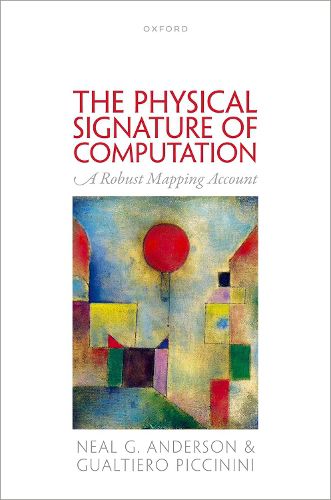Readings Newsletter
Become a Readings Member to make your shopping experience even easier.
Sign in or sign up for free!
You’re not far away from qualifying for FREE standard shipping within Australia
You’ve qualified for FREE standard shipping within Australia
The cart is loading…






In The Physical Signature of Computation, Neal Anderson and Gualtiero Piccinini articulate and defend the robust mapping account--the most systematic, rigorous, and comprehensive account of computational implementation to date. Drawing in part from recent results in physical information theory, they argue that mapping accounts of implementation can be made adequate by incorporating appropriate physical constraints. According to the robust mapping account, the key constraint on mappings from physical to computational states--the key for establishing that a computation is physically implemented--is physical-computational equivalence: evolving physical states bear neither more nor less information about the evolving computation than do the computational states they map onto. When this highly nontrivial constraint is satisfied, among others that are spelled out as part of the account, a physical system can be said to implement a computation in a robust sense, which means that the system bears the physical signature of the computation. Anderson and Piccinini apply their robust mapping account to important questions in physical foundations of computation and cognitive science, including the alleged indeterminacy of computation, pancomputationalism, and the computational theory of mind. They show that physical computation is determinate, nontrivial versions of pancomputationalism fail, and cognition involves computation only insofar as neurocognitive systems bear the physical signature of specific computations. They also argue that both consciousness and physics outstrip computation.
$9.00 standard shipping within Australia
FREE standard shipping within Australia for orders over $100.00
Express & International shipping calculated at checkout
In The Physical Signature of Computation, Neal Anderson and Gualtiero Piccinini articulate and defend the robust mapping account--the most systematic, rigorous, and comprehensive account of computational implementation to date. Drawing in part from recent results in physical information theory, they argue that mapping accounts of implementation can be made adequate by incorporating appropriate physical constraints. According to the robust mapping account, the key constraint on mappings from physical to computational states--the key for establishing that a computation is physically implemented--is physical-computational equivalence: evolving physical states bear neither more nor less information about the evolving computation than do the computational states they map onto. When this highly nontrivial constraint is satisfied, among others that are spelled out as part of the account, a physical system can be said to implement a computation in a robust sense, which means that the system bears the physical signature of the computation. Anderson and Piccinini apply their robust mapping account to important questions in physical foundations of computation and cognitive science, including the alleged indeterminacy of computation, pancomputationalism, and the computational theory of mind. They show that physical computation is determinate, nontrivial versions of pancomputationalism fail, and cognition involves computation only insofar as neurocognitive systems bear the physical signature of specific computations. They also argue that both consciousness and physics outstrip computation.